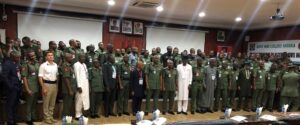
Chief of Army Staff, Lt.-Gen. Faruk Yahaya has said the Nigerian Army must continue to draw lessons from the Nigerian Civil War in tackling contemporary security challenges bedeviling the nation.
Yahaya said this on Wednesday in Abuja, at the Army War College Nigeria (AWCN) Annual Symposium on the Nigerian Civil War for participants of AWCN COURSE 7/2023.
The theme of the symposium is “Imperatives of Critical National Infrastructure in the Nigerian Civil War: Lessons for Operational Level Commanders”.
“It is said that nationhood can either be forged in the furnace of war or by peaceful means.
He noted that Nigeria, as a “very young nation” barely seven years after independence, had the sad experience of a violent civil war which lasted from July 1967 to January 1970.
The COAS said that the study of the Nigerian civil war had huge potentials to bring out valuable lessons that could contribute in addressing the current security challenges confronting the nation.
This, he said, informed the inclusion of the study of the Nigerian civil war in the AWCN curriculum, which was aimed at grooming the capacities of operational level leaders in basic military strategic thinking as well as operational planning.
According to him, thoughts, ideas and lessons from the past, gleaned from this symposium, can form a rhythm which will prove invaluable in solving the complex adaptive problems in the current security environment.
He said that the AWCN had done much by evolving robust training objectives that address the contemporary security challenges both in the areas of research and knowledge acquisition as well as in fighting.
Yahaya said the theme of the symposium was one of the key drivers of his vision to have “a Professional Nigerian Army ready to accomplish assigned missions within a joint environment in defence of Nigeria”.
“It is in line with this vision that the College invited erudite scholars, very senior officers and technocrats as well as captains of industries to be part of this symposium.
“This is to enable the participants and indeed the Nigerian army as a whole gain from their wealth of experience.
“The contemporary security environment is volatile, uncertain, complex and ambiguous.
“Lessons from the history of the nation show how quickly critical infrastructure that took years to build and are vital for national development can be destroyed in very little time.
“The loss of essential services in the North East due to the activities of violent extremist organisations and its impact on national security and development is proof-positive of the need for the protection of critical national infrastructure.
“The sudden rampage of hoodlums during the ENDSARS riots of 2020 which led to the destruction of critical national infrastructure to the tune of billions of Naira is another example of how quickly critical national infrastructure can be reduced to smolders,” he said.
He therefore said that the need to protect these infrastructures was thus crucial particularly as the nation bestirs itself within limited resources to ensure that it keeps up with global advancements in technology for the wellbeing of the citizens.
Yahaya commended the college for sustaining the conduct of the symposium and its drive to using the tool as a means of academic excellence, finding solutions to nagging contemporary security challenges and means of attaining and sustaining his vision.
He urged the course participants to use the opportunity to learn as much as they could, open up new vistas and perspectives in their minds and find veritable ways of applying the lessons learnt for the good of the army and the nation at large.
The COAS pledged absolute loyalty of the Nigerian army to President Bola Tinubu and their ardent commitment to the defence of the constitution of the Federal Republic of Nigeria.
“We shall continue to remain apolitical, professional and ever ready to accomplish assigned missions by operating within a joint environment in defence of Nigeria,” he said.
Commandant, AWCN, Maj. Bamidele Alabi, said the objective of the symposium was to study and teach both operational and strategic level activities of the Nigerian civil war.
Alabi said it was for better understanding of the battlefield events and operational outcomes as well as all activities that characterised the war.
He added that it was in the spirit of the mandate that the college organises an annual symposium on the civil war to create a forum to bring together scholars and experts to share their thoughts and personal experiences.
He further said that the choice of the theme was intentional, considering the giant strides made by the country so far in building relevant infrastructure for socio-economic growth and the need to protect those critical infrastructures from threats.
The symposium had paper presentations and discussions by scholars and experts in military history as well as retired senior military officers.
Comments